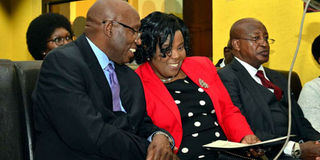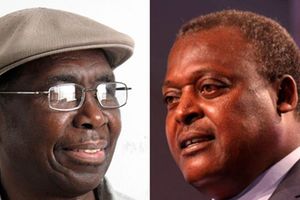Premium
JSC the weakest link in Uhuru, Judiciary ties

From left: Patrick Gichohi, Professor Olive Mugenda and Attorney-General Kihara Kariuki after they were sworn in as members of the Judicial Service Commission on November 21, 2018 at the Supreme Court. PHOTO | FRANCIS NDERITU | NATION MEDIA GROUP
What you need to know:
- The problem with the commission entertaining petty complaints and throwing judges under the bus at the slightest opportunity is that it is not just personal careers and reputations that end up getting hurt.
- The image of the Judiciary, as an institution, suffers as well.
- In the latest controversy over President Uhuru Kenyatta’s refusal to appoint 41 judges, the JSC is letting down the Judiciary again.
Our Judiciary still has an image problem, no doubt.
Its leadership includes a Deputy Chief Justice who spends her time at work hearing cases from the bench and worrying about the next one in which she is herself in the dock.
The Judicial Service Commission (JSC) – the judges’ and magistrates’ employer – has also dragged a number of judges to the tribunal and fired some magistrates in the recent past for corruption and other disciplinary issues.
But the Judiciary is also a victim of the relatively high accountability standards it has set itself and the cannibalism in its leadership ranks.
The reforms that started with the promulgation of the new Constitution in 2010 have seen the courts embrace a degree of openness in conducting their affairs.
Recruitment or vetting of judges by the JSC on many occasions involves live interviews on national television.
There is also an office of a Judiciary ombudsman to handle complaints of an administrative nature, such as those about missing files.
But the JSC also tends to admit, listen to and publicise all manner of citizen complaints, including some that would not make it past the askari’s desk in other public service offices.
A case in point is the petition against retired Supreme Court judge Jackton Ojwang’ that found its way before the tribunal sometime last year.
Someone showed up at the commission’s offices in Nairobi with sheets of paper alleging that the Migori County governor, then a litigant in a Supreme Court case, had upgraded the road to the judge’s rural home in Rayudhi village as a personal gift.
The JSC, without visiting Rayudhi to confirm if such a road existed or the two were neighbours as alleged in the petition, proceeded to ask the President to set up a tribunal to possibly remove the judge.
“On evaluation of the evidence, we find that there was insufficient basis for asking the President to form a tribunal to inquire into the conduct of the judge. This then leads us to the conclusion that there is need to establish a procedural threshold applicable by the JSC,” the tribunal ruled.
The tribunal fell short of calling the JSC lazy and the petition a waste of everyone’s time!
The problem with the commission entertaining petty complaints and throwing judges under the bus at the slightest opportunity is that it is not just personal careers and reputations that end up getting hurt.
The image of the Judiciary, as an institution, suffers as well.
In the latest controversy over President Uhuru Kenyatta’s refusal to appoint 41 judges, the JSC is letting down the Judiciary again.
The Attorney-General, who is a senior member of the commission, has come out to speak against a decision he was supposedly part of and even intends to challenge it in court.
The others won’t be seen or heard publicly speaking about the stalemate.
What was a JSC decision has suddenly become Chief Justice David Maraga’s personal battle.
[email protected]. @otienootieno





